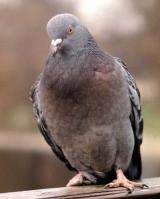November 11, 2015 report
Study shows transfer of immunity over two generations in pigeons

(Phys.org)—(Phys.org)—A team of researchers with Sorbonne Universités and Prédictive CEREEP-Ecotron Ile-De-France has found that grandmothers of pigeon chicks are somehow able to transfer immunity to a third generation, though the means is not apparent. In their paper published in the journal Biology Letters, the team describes how they injected three generations of pigeons with a protein to monitor their level of immunity response and what they found by doing so.
Suspecting that older generations were passing along immunity capabilities to more than just their own chicks, the researchers conducted a several year study of urban pigeons. They started by injecting 60 females with a protein called haemocyanin—it helps to transport oxygen in some invertebrates but does not do anything beneficial to pigeons. They also injected 60 additional female pigeons with a saline solution to serve as a control group. The team then injected the same protein into all of the offspring of the test pigeons, and then two years later, into all of the third generation of offspring as well. The purpose of the injections was to cause the birds to produce antibodies as a part of an immune response—after the birds were injected, blood tests were taken to see how strong of a response was triggered. They discovered that the immune response of the third generation was stronger for those chicks whose grandmothers had received haemocyanin than for those whose grandmothers had received the saline. This of course suggested that in reacting to the protein initially, the grandmother pigeons had developed an immune response that they had somehow passed down through their offspring, to their grand-chicks.
Logic would suggest that the grandmother birds had somehow sent antibodies to their offspring to be wary of the haemocyanin protein—if so, there would be evidence of more antibodies in the eggs of their offspring. But, testing the eggs failed to find more antibodies, which left the researchers stumped as to how the grandmothers were passing on their immunological message. They suggest the immune system must be trained in some other way (via hormones, possibly, or nutrients), which means more studies need to be done to find the ultimate answer.
More information: Transfer of humoural immunity over two generations in urban pigeons, Biology Letters, Published 11 November 2015.DOI: 10.1098/rsbl.2015.0780
Abstract
Maternal antibodies (MatAb) are known to provide passive protection early in life for young vertebrates but their effects on the development of offspring immune response across generations are still unknown. Here, we investigated the effects of antigen exposure (keyhole limpet haemocyanin, KLH) experienced by urban pigeon (Columba livia) females on the amount of antigen-specific antibodies (Abs) transferred into the egg yolk of their daughters and on the humoural immune response towards this same antigen in their grandchildren. We found that chicks from KLH-injected maternal grandmothers had a higher humoural response than chicks from sham-injected grandmothers. However, we did not detect a significant effect of female KLH exposure on the ability of their daughters to transmit anti-KLH Abs into their eggs. These results suggest that antigen exposure at one generation may shape the immune profile of offspring over two next generations, although the underlying mechanisms remain to be investigated.
Journal information: Biology Letters
© 2015 Phys.org


















